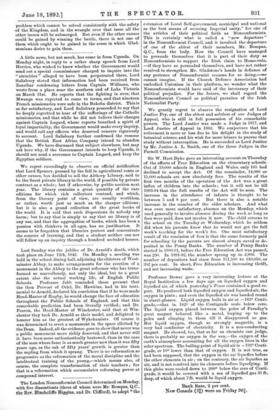Sir W. Hart-Dyke gave an interesting account on Thursday of
the effects of Free Education on the elementary schools. Out of 19,000 schools in England and Wales, only 165 had declined to accept the Act. Of the remainder, 14,000 or 15,000 schools are now absolutely free. The results of the first two months of the operation of the Act was a great influx of children into the schools ; but it will not be till 1893-94 that the full results of the Act will be seen. The increase in the attendance of infants is thought to be between 5 and 8 per cent. But there is also a notable increase in the number of the older scholars. And what was even more satisfactory, absence on the Monday, which used generally to involve absence during the week so long as fees were paid, does not involve it now. The child returns to the school on the Tuesday or Wednesday, which he seldom did when his parents knew that he would not get the full week's teaching for the week's fee. One most satisfactory result of the remission of fees is that the sums formerly paid for schooling by the parents are almost always saved or de- posited in the Penny Banks. The number of Penny Banks started in 1890-91, before the Free Education Act was passed, was 230. In 1891-92, the number sprang up to 2,806. The number of depositors had risen from 151,500 to 610,050, or 302 per cent. In short, Free Education is increasing thrift, and not increasing waste,






































 Previous page
Previous page